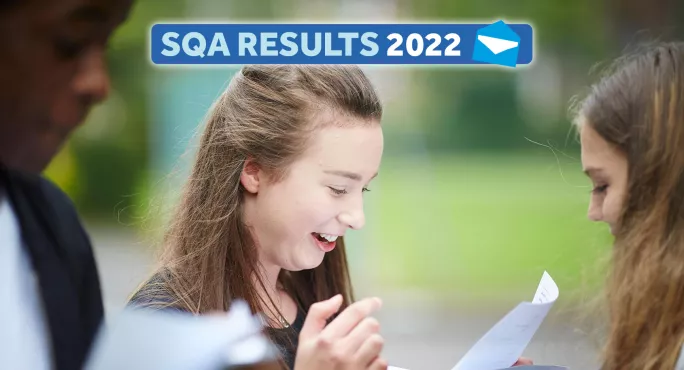High stakes exams ‘discredited’, say Scottish school leaders

The current system for assessing senior secondary pupils involving them sitting high stakes external exams has been “long discredited”, according to the general secretary of School Leaders Scotland (SLS), Jim Thewliss.
Mr Thewliss was speaking in the wake of the publication yesterday of the first Scottish exam results since 2019 - and as headteachers also started to voice concerns about the volume of appeals this year and the capacity to cope of the Scottish Qualification Authority (SQA).
End-of-year exams could not reflect all that young people had learned over their “educational journey”, he said.
Under the current system, too much was predicated on what happened in an assembly hall over four or five weeks in April and May, Mr Thewliss added.
- Background: SQA exam results day 2022
- Related: Why SQA exams 2022 are not a return to normal
- Analysis: SQA exams overhaul will need proper resourcing
Mr Thewliss said there were now more sophisticated ways to monitor learning and that students should be assessed at the point they were ready and given “due credit” then, instead of “having to wait for a specific point in time and perform”.
“Learning is a building process - you build on learning, you build up confidence, you build up resilience,” he said.
“Of course during that learning process young people could well sit down and do a test, but we do not want a system where for five weeks of the year things shut down and pupils are marched through the assembly hall door.”
Mr Thewliss said that school leaders were “reasonably content” with the results this year but that the system was ripe for overhaul and that more emphasis on continuous assessment, instead of end-of-year exams, could have an impact on the attainment gap.
One of the most controversial consequences of the return to national external SQA exams this year has been the widening of the attainment gap. This year at Higher the gap was 15 percentage points - lower than the last time external exams were held in 2019 when the gap was 16.9 percentage points, but much wider than last year when schools determined grades and the gap was 7.8 percentage points.
Mr Thewliss said SLS would feed its views on high stake exams into the independent review of assessment and qualifications being carried out by Professor Louise Hayward.
A more immediate challenge facing schools is appeals - the number of appeals was low last year when schools were responsible for grading pupils and students essentially knew their results ahead of the summer break.
But, the return of external exams is predicted to mean a return to higher rates of appeal in 2022 and some heads are questioning if the SQA will be able to cope with the volume of challenges - especially as appeals are free this year, unlike in 2019.
The last time external exams were held in 2019 there were 11,528 appeals (2.3 per cent of entries); last year there were 3,483 appeals (0.67 per cent of entries).
There is also a new route of appeal - that did not exist in 2019 - which means pupils can appeal directly to the SQA and do not have to go through their school or college. However, pupils can only appeal their exam results if their final grade is lower than the estimated grade provided by their school or college.
One depute head, who did not wish to be named, told Tes Scotland that around a third of senior pupils in his school would be appealing at least one grade.
He said this would present “another workload issue for teachers” and “additional stress for young people” which he argued could have been avoided if the SQA had “created a system whereby predicted grades would automatically be awarded should a young person perform below the estimate in their exam”.
He said: “Why go through the whole process of appealing and sending evidence when in almost every case - I assume - they will award the estimated grade? I would say around 35 per cent of senior phase learners will now be appealing at least one grade.”
A headteacher, also commenting anonymously, said half of the pupils in his school who had sat exams would be appealing.
“There will certainly be lots of appeals, which will create a huge workload both for staff and the SQA. As they are free this year, why would schools not put these in for all eligible?” the headteacher said.
“Multiply this out across Scotland and I’d have a concern about the capacity of SQA to process them all.”
Another headteacher said because the pupils in his school had not done as well as predicted - even though teacher estimates were below average exam performance - appeals were now likely to be higher.
The SQA said it was working closely with Professor Hayward to contribute to the discussion regarding the future of qualifications and assessment in Scotland.
A spokesperson added that National 5, Higher and Advanced Higher already included “a wide variety of assessment approaches including assignments, projects, folios, practical performances and question papers”.
On appeals, the spokesperson said the service was “designed in collaboration with partners across the education community, including teachers’ representatives” and that the SQA was “prepared to handle all appeals”.
More information on how appeals will work this year can be found here.
You need a Tes subscription to read this article
Subscribe now to read this article and get other subscriber-only content:
- Unlimited access to all Tes magazine content
- Exclusive subscriber-only stories
- Award-winning email newsletters
Already a subscriber? Log in
You need a subscription to read this article
Subscribe now to read this article and get other subscriber-only content, including:
- Unlimited access to all Tes magazine content
- Exclusive subscriber-only stories
- Award-winning email newsletters
topics in this article



